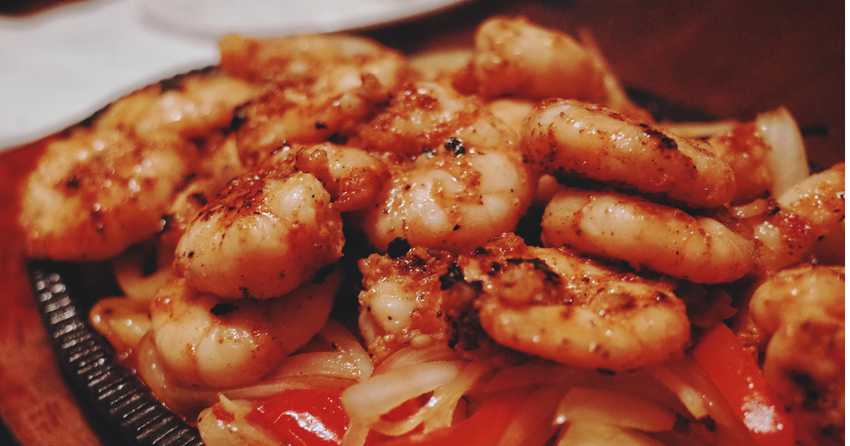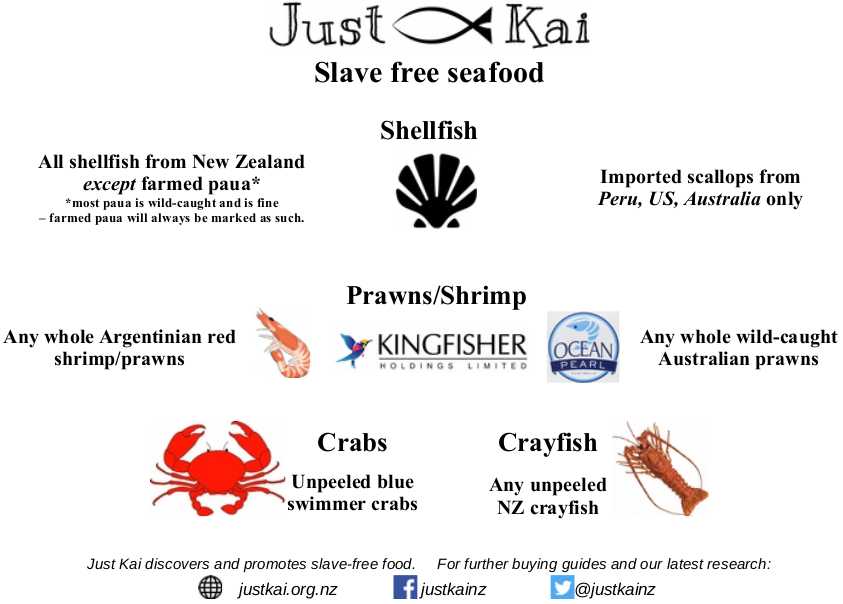Just Kai has completed a new extensive research project on seafood! We now have recommendations for prawns and shrimp, shellfish, crabs and crayfish. Sadly, we haven’t managed to find any squid or scampi we’re confident is slave free, nor any prawn dumplings - but for everything else we have good recommendations. Read our detailed research here or download a summary pdf.

This has been a challenging project as the ethical issues in different kinds of seafood are quite different, so there’s been a lot to understand.
Shellfish
In general, we recommend any wild-harvested New Zealand shellfish as it is collected close to shore in a country with strong labour laws: it is, simply, much harder to keep someone in slavery in those conditions than on a vessel out at sea. For the same reason, we recommend unpeeled New Zealand crayfish and crabs.
Mussels and oysters farmed in New Zealand are also OK. Unlike farmed salmon, they aren’t fed a fish-derived feed (where the fish in that feed is highly likely to have been caught using slave labour) - the farms are located in the sea and they simply feed on the algae and plankton naturally occuring there. The farms are located close to land in a country with strong labour laws, so we have no concern about slavery there.
Farmed paua, on the other hand, is fed a fish-derived feed and we haven’t found any brands who can assure us their feed is slave-free. However, farmed paua is rare - most paua you will see is wild-harvested and will be fine
Some scallops you’ll see for sale will have been gathered in New Zealand, but the majority are either farmed or wild-caught overseas. Most of the farming occurs in countries that commonly use slave labour in their seafood industry, and we do not recommend any overseas farmed scallops. However, wild-caught scallops from the US, Peru or Australia are fine. Watch out for UK scallops, though - there have been many reports of slavery in that industry, despite it being a country with strong labour laws.
Prawns
Prawns are ethically very complicated. Most of the prawns sold here are farmed, and they are often farmed in countries where slave labour is commonly used in seafood production. In addition, the vast majority of farmed prawns are fed on feed that includes fish (although a handful of farms are moving to insect-derived feed) and this is very commonly caught using slave labour. In addition, slave labour is commonly used to peel prawns, so there are a great many risk points!
We haven’t found any prawn dumplings we can recommend: however, for pretty much everything else we have found options.
Kingfisher prawns (sold by New World and PakNSave) sells a variety of processed prawn products (peeled prawns, cooked prawns, prawn cutlets etc.) that, whilst being farmed in a high-risk country (Thailand) have been well audited throughout the supply chain.
In addition, we recommend prawns from Argentina that are wild-caught, whole and unpeeled (sold as Argentinian red prawns or shrimp - likely available from your supermarket’s fish counter) as well as similarly wild-caught and unprocessed prawns from Australia.
Crabs, crayfish, scampi and lobster
New Zealand crabs and crayfish, like shellfish, are either farmed (without being fed fish) or are wild-harvested close to shore. We recommend any New Zealand crabs or crayfish, so long as they are unpeeled. We similarly recommend Australian crabs. The crabs you will most likely see that meet these conditions are Australian blue swimmer crabs; all crayfish are almost certainly from New Zealand.
Scampi are also from New Zealand, but they are caught far out at sea on boats that are out for months at a time. There have been many reports of slavery on such vessels, even in New Zealand waters. We don’t recommend any scampi.
Lobster is almost all imported (technically, New Zealand crayfish is a kind of lobster, but it’s only very rarely marketed as such), and mostly from jurisdictions where slavery in seafood is common. We haven’t found any lobster we are confident is slave free.
Squid
Squid is another species caught far out to sea on fishing vessels that are at high risk of slavery. Sadly, we haven’t found any brands or jurisdictions where we are confident their products are slave free, although we do feel that whole squid fished in New Zealand waters is your lowest-risk option.
Our recommendations are summarised in the below graphic, which you can also download as a pdf.
